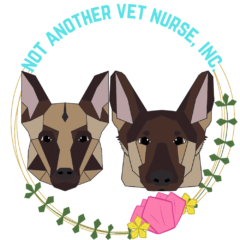For the people wanting to join the field, in the process of it or currently in it, we got you covered. Let us fill you in on what’s in store and what truly goes on behind clinic doors. We ask that you keep an open mind and know that everyone’s journey is different. However, there are many parallels that every Vet Med professional has experienced at some point during their career. Whether those experiences were positive or negative, we can all agree that we wish we would’ve been told about many of these issues prior to getting into the field- so here’s the tea.

Self-Care:
This is number 1 on the list for a reason and we cannot emphasize this enough! Self-care is an extremely personal and an imperative practice that is essential to navigating your way through the compassion fatigue, and the unavoidable mental stress that the veterinary field brings. It’s personal in the sense that the best self-care is something that is near and dear to your heart. It’s whatever makes you as an individual feel joyous, fulfilled and above all- HAPPY. For most, the most popular forms can be occupational, intellectual, spiritual, social, emotional, physical, financial, creative, and/or environmental. Though you may not practice every single one of these methods, it’s important to practice activities that mean the most to you and provide that very necessary boost of serotonin. Do things in your off time that feed your soul and wellbeing, keep both your mind and body as strong as possible and allow you to let go. For some this can look like spending time with loved ones and for others this can be spending time alone. Some prefer to get outside and soak up the sun, whereas some prefer to stay indoors curled up with a cozy blanket and a good book. No matter what you do, just remember that prioritizing yourself is self-care and that it is 100% necessary in the Vet Med world, no matter your role. Finding something to occupy your time is critical as it’s when your mind starts to wander that you remember all of trauma you just went through in the last week. The euthanasia’s, the abuse cases, the horrific injuries, the verbal abuse from that one client because you couldn’t trim their toenails as you were more concerned about saving their life. You MUST find something to balance your mind, your heart, and your spirit to keep yourself on stable ground. The good only comes when the bad has been tucked away, but it does come eventually. Be sure that you take in all of the good moments you possibly can. See the ones you love, go on that trip, read that book, buy that car, do what makes you happy so when the next week comes, you can come in with a clear mind and full heart ready to save the next one.

Boundaries:
We cannot stress this enough– boundaries are essential to preventing burnout and compassion fatigue. Things like learning to say “no”, asking for help, disengaging from an abusive client or coworker (including your superiors), delegating tasks, taking breaks/lunches (this is your daily reminder to EAT), leaving at the end of your scheduled shift, and utilizing your vacation/PTO; these are all vital to your success. Also- speak up! If you are uncomfortable with performing a certain treatment, if you have questions, if you feel something is “off” with a patient or situation, you need to be communicative about the issue at hand in a calm, respectful manner so everyone is aware of the boundaries you are setting in place. Your clinic is only as good as it’s people, and you are no good to your patients if you are stuck running on empty due to a situation that could’ve been preventable. Always keep in mind that only healthy vets can help healthy pets!

Have a Good Therapist:
We know what you’re thinking- it’s the exact same thing all of us thought when we first got into the field. It’s (most likely) “I feel okay right now, I don’t need a therapist or help.” However, this is crucial and could save your life. The Vet Med field has one of the highest suicide rates in the United States. Having a neutral party to speak with on those days when you put down 6 animals, saw 4 abuse and/or hoarding cases, lost a pet under anesthesia, worked tirelessly for 10+ hours trying to save one dog only to lose them and get screamed at by their owner afterwards or even losing them during their treatment. Trust us, that therapist will come in handy. And again- this could save your life! Of course, the hope is that you will never have to experience any of these situations, but these cases are becoming all too common. The hope is also that you will not have to go through the heartache of losing someone you loved due to the compassion fatigue they experienced in the field. The devastation it causes is something that words cannot possibly express, and the impact of that loss is greater than you know. The hope is that in those deep, dark moments where you feel everything you’re doing is wrong, and the hopelessness creeps in, you NEED help and that’s okay- we cannot lose you. It is okay to feel your emotions after experiencing something traumatic, it’s okay to be upset- know that your feelings are always valid. The danger is when compartmentalizing has become second nature. When you have become so desensitized to those horrible situations that you have little to no reaction. It is healthy to have these reactions and it does NOT make you weak. You will have good days and bad days. You will fluctuate between happy, sad, and mad. You will have days you want to quit and just straight walk out. You will have days when you feel like you just can’t go on because you’re in mental and/or physical pain. However, you will also have those days when you can’t wait to get to work. To see your friends, learn new tricks or to see your favorite patient. The truth is you’re lying to yourself if you think some or all of this won’t happen to you at some point- this is our reality. Always feel your feelings and if you need to take a moment to go outside and have a good cry- go, we’ve all done it! If you feel like there is no one will understand these feelings, please know that you are not alone. Please know that it is imperative that you express those feelings with someone- preferably a licensed professional- who can give you the necessary tools you’ll need in order to get yourself out of your own head and provide a different way of thinking or a new perspective on your situation. If you haven’t considered a therapist and are unsure of where to start you can reach out to your HR department for mental health resources that your company provides. Or you can always utilize self-serving platforms such as Better Help, Talkspace or Cerebral. One big suggestion would be to find a practitioner that has a focus in compassion fatigue as they will be able to give you more personalized care to correlate with you daily grievances.
**If you are struggling, please reach out to The Suicide Prevention Hotline at 988.**

Know Your Limits:
This goes for both mentally and especially physically. Do NOT push through the pain– we hate to break it to you, but you are not Arnold Schwarzenegger. Far too often we sacrifice our bodies in these roles in order to complete the task at hand and worry about any physical or mental anguish later. Getting caught up in the moment is normal in the craziness, but always remember to force yourself to stop, take a breath, evaluate the situation and how you feel in that moment. Know that you are only one person and will not be able to do it all no matter how badly you want to. You are not a superhero and those are extremely unrealistic expectations. As a natural caretaker these are not emotions you can easily escape, but it’s okay to ask for help! On the other hand, it is also normal to feel guilty when doing so. It’s important that you feel comfortable enough to ask for sedation on an aggressive or wild patient you need X-rays on. If you need to lift massive pup, ask for an extra set of hands or utilize lifting tables instead of your backs and know when you need to get some fresh air to help reset your mind. If you can’t find the vein, ask for someone else to try and find it. If your body is completely depleted, go home and don’t work any unnecessary overtime. And eat something! Your mind and body will thank you later if you create good habits starting now!

Be Open Minded:
Medicine is an ever-changing profession and adaptability is very important. There are new treatment and diagnosis’s evolving every single day. This mean that continuing education, good problem-solving skills, thorough research and quick thinking will save you in this field. You can always reach out to your development team, direct managers or HR to inquire about continuing education opportunities through your clinic. If provided, we highly suggest taking advantage of them! It is also beneficial to do your own digging into the specific branches of Vet Med that speaks to you the most such as Animal Behavior, Rescue/Shelter, Emergency/Critical Care, Anesthesiology, Cardiology, Internal Medicine, Neurology, Ophthalmology, Oncology, Dermatology, Surgery and Radiology. Find what interests you as you produce the best work when you’re doing something you are passionate about and good at! Every single one of us has something to offer this field, and we would all be lost without each other given the individual roles each of us play to contribute to our hospitals. Comradery, freethinking and teamwork will help you and your coworkers remain open minded to new and more effective ways to successfully practice veterinary medicine.

Appreciate Every Position:
If you haven’t already noticed the “it’s a team effort” line isn’t just a phrase when it comes to a Vet Med- it’s a fact. Every role is extremely critical for every clinic to operate and above all provide excellent service. Ideally, clinics should function like a well-oiled machine. Every position is vital to creating the best experience for every client and their fur babies. Every individual employee should complement and appreciate each other’s strengths and provide support when the other’s show weakness- teamwork makes the dream work! Know that passion is key, but compassion is what truly keeps the doors open. Think about how many different employees your client encounters through a typical visit. Upon arrival they’re usually greeted by a Client Care Representative, then taken into the room with the Vet Tech, in comes the DVM, students, Vet Assistants, trainees, possibly a kennel tech coming in at the end of the visit to tidy up the room for the next client. Also consider this, the usual ratio is 3 staff members per DVM. If your clinic has 5 DVM’s onsite that is 15 technicians, along with Client Care Coordinators, Practice Managers, Kennel Techs, etc. making the full staff somewhere around 30+. Even that amount is an extremely small staff compared to most corporate hospitals. Without even just one of these positions, the entire operation fails. We need to value positions other than our own in order to work as a team. Supporting each other is essential in order to have a positive, compassionate, and healthy environment. If you see that your coworker had an extremely difficult day, buy them lunch. Bring them their favorite snack because you will rarely have time to eat. Write them a silly note and leave it on their clipboard or the staff whiteboard. Find ways to show love and appreciation as building walls between each other only creates animosity and unwanted negativity in an already negatively charged environment- which is (unfortunately) unavoidable. When animals are involved it’s only natural for human emotions to be involved and therefore heightened. The best thing to keep in mind is this phrase- “Remember why you started”. Remember why you work more hours than you spend at home. Remember why you went to school for all those years torturing yourself doing conversions and learning all those medications you can’t even pronounce. Remember why you sacrifice your body every day to sedate a dog that’s the size of a horse. Remember why you started. We all joined this profession for one reason and one reason only- we love animals. We are natural caretakers, and we find purpose in helping those who cannot help themselves. That is (most likely) why you started. This goes for every staff member no matter the department, every single one of us. We are all in this together, and if we cannot support and appreciate one another then no one will.

Stand Up for Yourself:
Speak up and speak out! One of the biggest issues in this profession is bullying. From clinic confrontations, to cyberbullying by pet owners, keyboard warriors, client reviews and even our own teammates judging us and being negative. None of these are acceptable, but we can only control what happens within our clinics. If you have an issue, speak out. There are many ways to discuss your grievances while remaining respectful to your fellow employees and even your clients. You are not required to tolerate disrespect, harassment, and judgement from clients and especially not from your teammates and superiors. If you are in any way uncomfortable with something, report these issues to your HR department immediately. Though it is rare, there are situations where even those who are supposed to be there to help and protect you, do not. If that’s the case, you can get out. You are under no obligation to stay in a negative and toxic environment that does not serve you no matter how much you love the animals. When it comes to clients, report any of these issues to your direct manager as that kind of behavior is not acceptable in any work environment. Let alone an environment that is potentially life & death. Do not feel guilty!
All in all, the veterinary field is not for the faint of heart. It’s difficult and tiring. Yet at the same time it can be incredibly beautiful and rewarding. There are moments you wish you could forget, followed by moments you hope you never forget. It’s a love/hate relationship only built for a certain kind of person. No matter what you decide to do, just know that there will be a group of peers behind you who completely understand you and will fight to the death to protect you just as you would for them. We are feisty, fierce, caring, loyal to a fault and giving beyond measure. If you take anything away from this just be sure that you take care of yourself- so you can be there to take care of them.
Honorable Mentions:
“Don’t be afraid to leave if someone is toxic or not a right fit. So many people feel guilty leaving because they know it’ll leave the practice shorthanded. But if something isn’t healthy for you, get out and try something/somewhere else. Don’t carry that guilt with you.”- @renewvetconsulting
“Mentorship! Someone you trust in the industry/at your workplace if possible! To help you learn the job but also how to do all of the above.”- @bintstagram_
“Take each day as it comes. Don’t go in thinking “today is going to be a bad day because patient x is coming in and always gives us trouble and the owner is mean. The day will be what it will be. The owner could be a delight that day (we never know what people are going through), and maybe they remembered to give their pet the anti-anxiety meds or maybe they worked with a trainer on those behaviors. Just roll with the punches, remember your worth, and let negativity slide off your back like water off a duck. That last one is hard, but if I can do it then anyone can! I promise!!”- @daenerysandmissandei
“Find a good fit for your standards and ethics <3”- @laurafromkc
“It’s okay to say when you feel something isn’t right, our patients rely on us to advocate for them, and you have a voice <3”- @theexoticsnurse
“Support each other/don’t tear others down”- @vegandinosaur
Written by Robyn Dubay-Delatorre
**Stock images used**
